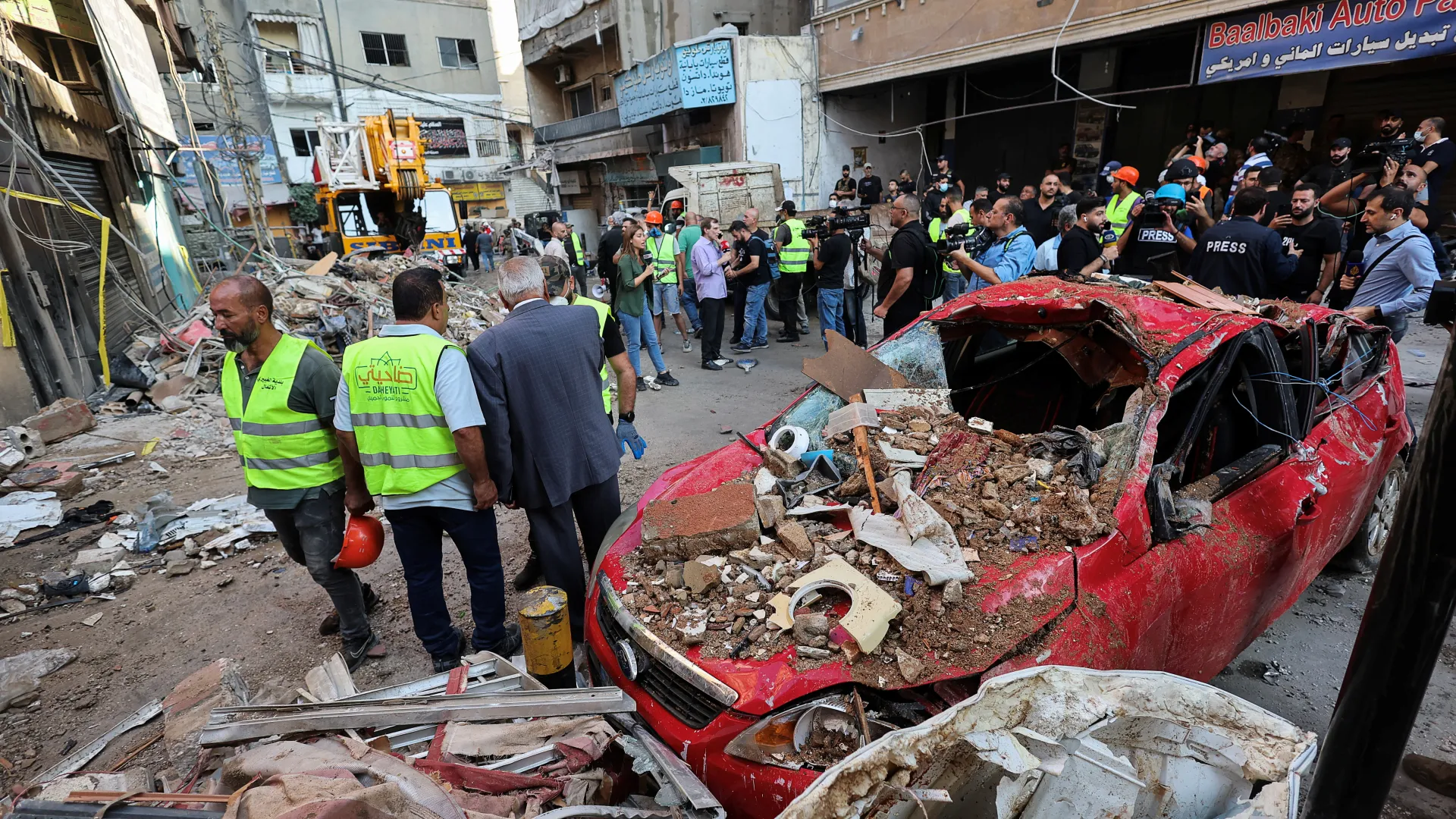New Occasions in Beirut
On October 6, 2023, a progression of strong blasts shook the thickly populated neighborhoods of Beirut, causing boundless frenzy and harm. The shoots happened one after another during the late evening, with the underlying blast detailed close to the Hezbollah central command in the southern rural areas of the city. Observers depicted the scene as tumultuous, with a stunning commotion that shook structures and broke windows. Inhabitants poured onto the roads, their confronts scratched with dread and disarray as the hints of alarms swirled all around.
Neighborhood specialists quickly answered the circumstance, sending crisis administrations to the impacted regions. Medical clinics in Beirut were overwhelmed with losses, with numerous people experiencing impact related wounds. The Lebanese Red Cross detailed countless individuals experiencing shock and injury, as the local area wrestled with the frightening consequence of the occurrences. Security powers started an examination concerning the impacts, zeroing in on expected connections to the continuous strains among Lebanon and Israel.
This occurrence comes against the setting of rising threats in the locale, quite the stressed connection between Hezbollah — an unmistakable Lebanese assailant bunch — and the Israeli government. Throughout the course of recent months, conflicts along the Israel-Lebanon line have heightened, further exasperating the generally unstable circumstance. Onlookers estimate that the new impacts might be an acceleration of this contention, as the two players stay dug in their positions. As the residue settled, questions arose in regards to the thought processes behind the blasts, whether they were a response to Israeli airstrikes or a provocative move by Hezbollah to declare its impact.
Once more in this environment of vulnerability, Beirut gets itself the focal point of local pressures, constraining its occupants to go up against the dreary truth of living in the midst of contention. The quick effect of the impacts highlights the delicate idea of harmony in Lebanon, featuring the perils that continue in a scene scarred by history and strife.
Israel’s Support for Focusing on Hezbollah
The support for Israel’s tactical strikes on Hezbollah has developed over the long run, to a great extent established in a verifiable setting set apart by continuous struggle between the two elements. Israeli authorities contend that their activities are driven by a need to kill dangers exuding from Hezbollah, which they see as a fear monger association with uplifted military capacities. The association, situated in Lebanon, has been engaged with various showdowns with Israel, the most striking being the 2006 Lebanon War, which brought about critical setbacks and obliteration. This earlier clash builds up Israel’s position that immediate military commitment is important to guarantee public safety.
Israeli pioneers every now and again refer to Hezbollah’s broad arms stockpile of rockets and rockets, which they guarantee represents an impending danger to Israeli residents. They contend that Hezbollah’s tactical framework is in many cases implanted inside regular citizen populaces, muddling the dynamic cycle for strikes, and uplifting the gamble of blow-back. Moreover, they fight that Hezbollah’s partnership with Iran further worsens what is happening, as it empowers the exchange of cutting edge military innovation and financing to the association, consequently improving its capacities against Israel.
In evaluating the tactical ramifications, Israel’s system addresses a proactive way to deal with counter-psychological warfare, expecting to discourage future assaults by exhibiting an eagerness to conclusively act. This procedure isn’t without political repercussions; it requires Israel to painstakingly explore worldwide relations, especially concerning Lebanon and other Middle Easterner countries, while keeping a convincing legitimization for its activities according to its partners. The continuous pattern of savagery likewise brings up issues about long haul security. It stays fundamental for Israel to offset prompt military requirements with strategic endeavors to de-raise pressures in the district.
Responses from the Worldwide People group
The new impacts in Beirut and Israel’s tactical activities focusing on Hezbollah base camp have incited a range of reactions from different worldwide entertainers, underlining the intricacy of the international scene in the Center East. State run administrations across the globe have communicated their interests in regards to the raising savagery, highlighting the potential for more extensive provincial flimsiness. Significant powers, for example, the US and the European Association have called for guaranteed restriction and discourse among the elaborate gatherings. Their assertions frequently feature a guarantee to discretionary arrangements, while repeating the significance of defending regular citizen lives in the midst of continuous threats.
Territorial players have likewise shown up, with Iran, a critical partner of Hezbollah, voicing compelling judgment of Israel’s airstrikes and promising to help its partners in Lebanon. Conversely, Bedouin countries with strategic connections to Israel have ended up in a shaky position, as they balance their international strategy goals with public feeling, which is frequently thoughtful to Palestinian causes. The responses are additionally convoluted by the different interests and coalitions that portray the Center Eastern political scene, prompting calls for both de-heightening and, strangely, military help for different groups.
Also, worldwide associations like the Assembled Countries have encouraged the two sides to practice limitation, underscoring the requirement for supported philanthropic access and the assurance of regular people. Experts caution what is happening may influence provincial dependability as well as have sweeping ramifications for worldwide security. The interconnectedness of different contentions in the area implies that a heightening in Lebanon could impact strains somewhere else, especially in regards to Iranian impact and the continuous emergency in Syria.
Through these multi-layered responses, it becomes clear that the worldwide local area is intently observing the turns of events, looking for a harmony between support for harmony and the realistic contemplations of public interests in a sensitive international climate.
Suggestions for Lebanon and Provincial Solidness
The new impacts in Beirut and Israel’s tactical negative marks against Hezbollah base camp have huge ramifications for Lebanon’s soundness and the more extensive international scene of the Center East. These occasions influence public opinion as well as impact homegrown political elements inside Lebanon, possibly intensifying existing strains among different groups. The mind boggling nature of Lebanese legislative issues, described by a sensitive overall influence among different strict and political gatherings, may confront elevated difficulties as general assessment turns out to be progressively enraptured in light of ongoing viciousness.
Hezbollah, as a conspicuous political and military power in Lebanon, ends up at the focal point of this continuous emergency. The association’s double job convolutes its capacity to explore the advancing political scene, particularly as it answers both homegrown difficulties and outside pressures from Israel. Public impression of Hezbollah could move, for certain residents possibly seeing the association as both a protector against outside hostility and a supporter of inner insecurity. The test lies in keeping up with well known help while tending to security concerns emerging from rehashed conflicts with Israel.
In addition, the international ramifications reach out past Lebanon’s boundaries, influencing provincial strength in different ways. Adjoining nations and outside powers intently screen what is happening, perceiving the potential for raised struggle that could undermine the whole locale. The reaction from other territorial entertainers, including Iran and Bay states, will probably shape Lebanon’s future, as they either support or go against Hezbollah’s activities and the Lebanese government’s position on these occasions.
In rundown, the implications of the impacts in Beirut and the tactical reaction from Israel not just involve a reassessment of interior political equilibriums inside Lebanon yet additionally welcome examination from different countries, impacting the more extensive provincial elements. These improvements support the sensitive idea of the Center East, where each activity has the possibility to set off a more extensive clash or advance a more steady conjunction.

